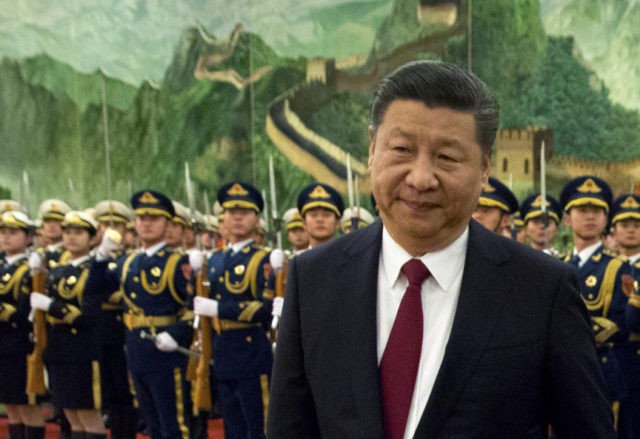WASHINGTON, DC — China is employing “neo-colonialism” tactics in Africa in the form of predatory loans collateralized with natural resources and strategic assets, experts cautioned lawmakers on Wednesday.
The loans allow Beijing to strengthen its military ties to the continent, enhance political leverage, export communist authoritarian ideology, and gain access to viable army positions that can threaten the American homeland
In written testimony prepared for a House Foreign Affairs Subcommittee on Africa hearing on Wednesday, author Gordon Chang, an expert on China, declared:
I conclude that [President] Xi Jinping, the Chinese ruler, believes his country should be the world’s only sovereign state, which is the essence of colonialism, and that today his country’s relations with Africa resemble a new form of colonialism. Moreover, I believe Xi’s ambitions for Africa, however one characterizes them, threaten America.
…
Africa gives China the ability to threaten the U.S. homeland. Beijing wants a [second overseas] military base at [Namibia’s] Walvis Bay … [in] the Atlantic off the African coast. In the Azores, specifically the island of Terceira, Chinese aircraft could control the mouth of the Mediterranean and would be closer to New York than Pearl Harbor is to Los Angeles. … A belligerent China in Asia is bad enough. A dangerous China much closer to our shores is far worse.
Already, China reportedly provides Africa with more financing than any other country in the world, noted Joshua Meservey, an Africa expert at the Heritage Foundation think tank, in his written remarks prepared for the House panel.
He estimated the total amount of loans to African governments and state-owned companies stood at about $85 billion between 2000 and 2014, acknowledging Chinese lending to the continent is mostly obscure.
Last August, China established its first overseas naval base in the African country of Djibouti, home to America’s largest permanent military installation in the continent—Camp Lemonnier.
Chang believes China is seeking to soon erect a second naval base, in Walvis Bay in Namibia.
Gen. Thomas Waldhauser, the top commander in Africa, told lawmakers this week that the United States is closely monitoring the Chinese military presence in Djibouti.
Making matters worse for the United States, China owns Djibouti debt worth an estimated 60 percent of the country’s gross domestic product, prompting Meservey to caution lawmakers that such a holding may give Beijing “significant leverage over a country critical to U.S. military operations in Africa.”
Scott Morris, an analyst at the Center for Global Development think tank, pointed out that Djibouti is one of the countries most vulnerable to debt distress, stemming from China’s financial practices in Africa, which he linked to Beijing’s ambitious multi-trillion dollar investment One Belt, One Road (OBOR) project, also known as the Belt and Road Initiative (BRI).
“Our analysis suggests that Djibouti’s external debt, already very high for a low-income country, could rise to over 90 percent of GDP under Belt & Road lending. Equally important, nearly all of this external debt (over 90 percent) will be owed to China,” he testified.
Unlike other witnesses, Chang described China as “an imperial power” in Africa, noting that “some of the dealings between Beijing and African states seems to be tainted by both corruption and subtle forms of coercion, thereby undercutting African free will.”
He identified such moves as predatory loans that allow China to gain power over the debtor countries, telling lawmakers:
Although Beijing provides “no-strings-attached” and low-interest loans—what looks like the apparent opposite of colonization—this easy money encourages governments to spend irresponsibly, creating the debt crises of the future.
…
With the enticement of low-cost loans, Beijing gets the opportunity to corrupt officials, obtain the rights to extract minerals and hydrocarbons, flood local markets with manufactured goods, send its workers to Africa, and strain local economies with trade imbalances.
According to the experts, China is challenging U.S. influence in Africa by implementing colonialism tactics that allow Beijing to carry out nefarious activity, including predatory loans, imposing troop presence, military espionage, exporting its authoritarian communist ideology through “48 Confucius Institutes and 28 Classrooms in 38 African countries,” and gaining influence in financially vulnerable governments.
Once the country that receives a loan finds itself trapped in debt, it makes it easier for China to gain “support for its geopolitical goals. One of those goals is the undermining of democracy and the consequent fortification of authoritarianism” something that goes against U.S. interests, cautioned Chang.
Not all experts who testified on Wednesday agree that China is acting as a colonial power in Africa.
“It may be convenient to argue that China’s presence is neocolonial, but that fails to consider African agency in determining the scope and scale of their relations with China. China’s strategy is rooted in its imperative to access resources and markets and to appear to be a responsible global power,” argued Dr. Anita Plummer, an assistant professor at Howard University.

COMMENTS
Please let us know if you're having issues with commenting.